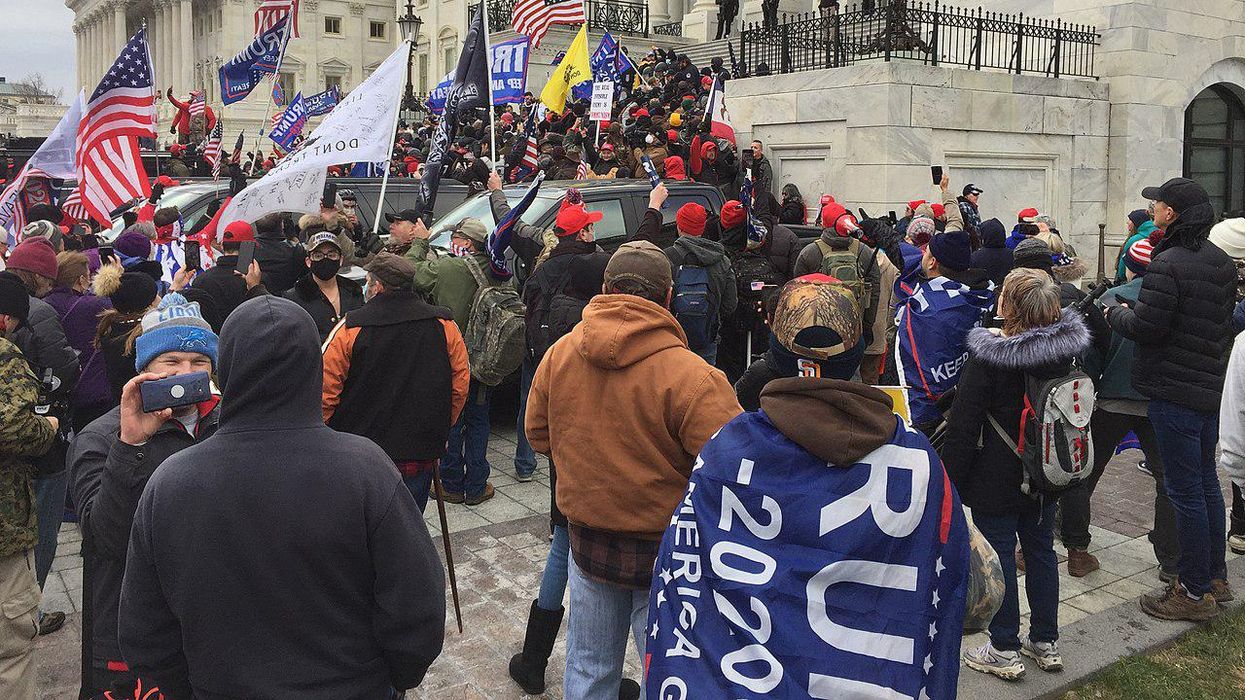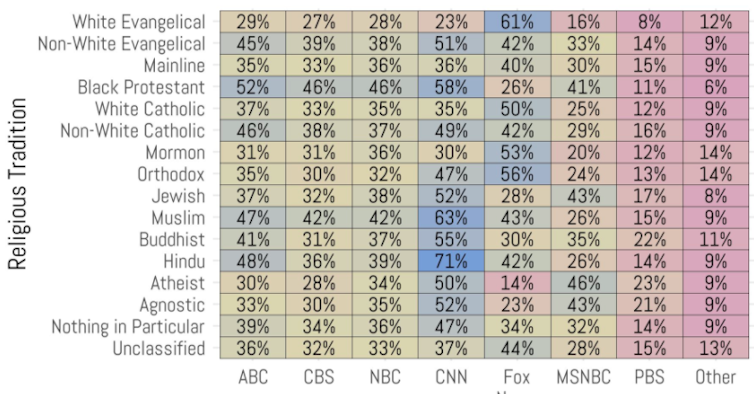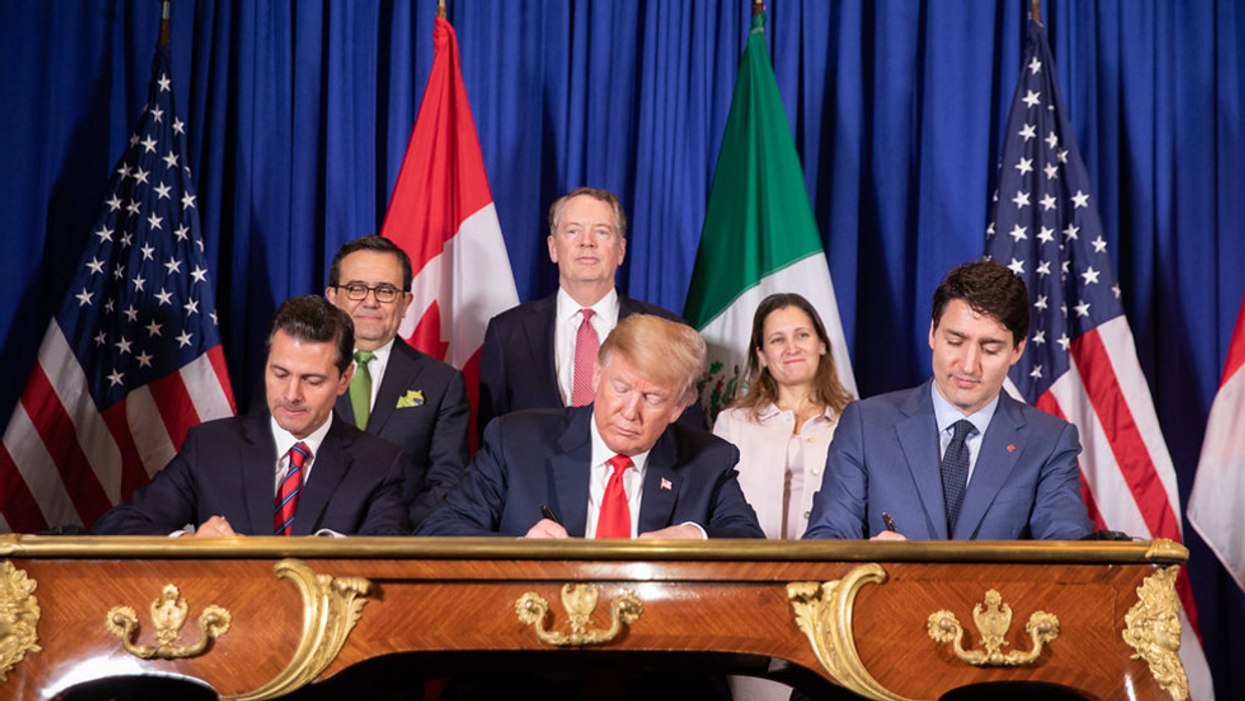By JAMES ROSEN
HARTFORD COURANT | MAR 09, 2021

FILE - In this Jan. 6, 2021 file photo insurrectionists loyal to President Donald Trump try to open a door of the U.S. Capitol as they riot in Washington. (AP Photo/Jose Luis Magana, File) (Jose Luis Magana/AP)
Decades before Donald Trump’s naked call for lawless revolt, Republican leaders in Washington launched the party’s descent into insane nihilism fueled by a conspiratorial, visceral hatred of government.
I know. I was on the front lines covering it.
Two months after the insurrection at the U.S. Capitol, the widely accepted view of the former president persists: He remade the Republican Party in his image and will be a GOP kingmaker long into the future.
The truth is, the GOP started creating the Trump presidency decades before Donald J. Trump assumed office.
The stubborn belief that Trump remade the party is based on a misunderstanding of a fundamental dynamic that has shaped Washington politics for more than a quarter-century since I arrived to cover the national capital in September 1994.
Two months after I came to Washington, the unimaginable happened: Republicans, led by Newt Gingrich, captured control of the House of Representatives. They ended Democratic domination extending back to World War II. Their victory shocked journalists who’d dismissed Gingrich as a flamboyant wild man from the backwoods of Georgia.
Gingrich had long coattails. Across the country, Republicans won governorships, statehouse seats, mayorships and city council posts.
The day after that election, my editor in Raleigh, North Carolina, took me out to lunch. He had summoned me back to Raleigh for an emergency meeting with his other government reporters. The News & Observer had won Pulitzers as the most important political paper in North Carolina. My colleagues in Raleigh covered the governor, legislature and state government agencies, along with the mayors and local governments of Raleigh and a dozen booming suburbs.
In a state with Democratic roots in the Civil War, voters had just elected five Republican representatives to the U.S. House, more than any other state except Washington.
“How did we miss this?” my editor bemoaned over lunch. “Why didn’t we see it coming?”
Fixing his gaze on me, he said: “We’ve been neglecting our conservative readers. I will never let this happen again.”
And so, back in Washington, over the coming months I covered the Republicans’ increasingly radical attempts to cripple the federal government. Intoxicated by his newfound power as House speaker, Gingrich’s ambitions extended far beyond the modest reforms in the “Contract with America,” his savvy campaign-marketing ploy. His acolytes, many of them political outsiders with ignorance of government (something that would become a hallmark of Trumpism), followed his dictates with fanatical fervor (another trait of the ex-president’s current congressional enablers).
They tried to eliminate the Commerce Department but were repulsed by business groups accustomed to billions of dollars in grants and other aid.
They tried to get rid of the Education Department but were defeated by nationwide PTA groups and teachers unions.
Unable to do away with the Environmental Protection Agency, they tried to weaken the two landmark laws that had cleared big cities’ skies and cleaned rural areas’ waters.
Presaging Trump’s purposeful hostility to science, the slogan “junk science” became their rallying cry, a symbol of all the burdensome federal regulations they were trying to roll back.
The Republicans’ efforts to dilute environmental protections failed, as they learned the shocking news that Americans like clear air and clean water.
Unable to accomplish their nutty policy aims, the Republicans turned personal. Funded by an Arkansas billionaire, they demonized Bill and Hillary Clinton. The ostensible foes of government spending wasted boatloads of taxpayer dollars on Soviet-style Senate show hearings about modest real-estate investments the Clintons had made in Little Rock, turning “the Whitewater scandal” into the crime of the century.
Under the next Democratic president, GOP lawmakers and activists became meaner. With the first Black man in the White House, their lies moved from the scientific or political realms to the realm of race. Birther claims about Barack Obama’s origins and thus core legitimacy as president preceded Trump. With his middle name of Hussein and his childhood stay in Indonesia, Obama was mocked as a closet Muslim, his core allegiance to America questioned.
The head of the Orange County Republican Party in California emailed friends a picture of first lady Michelle Obama as an ape. When her crude drawing became public, she was reprimanded – but not removed from her prominent post in one of the country’s most affluent and populous suburban counties.
The violence that appalled the nation at the Capitol in January was on full display as far back as 2009 at dozens of Democratic lawmakers’ town hall meetings with constituents across the country, as fanatics with the new tea party movement barged in, yelled threats and ransacked furniture. Just like Trump’s invading army of misguided rioters, they styled themselves as patriots saving the republic from ruin.
After the 2008-09 financial collapse, only three Republican members of Congress voted for Obama’s stimulus package despite an economy careening toward depression.
A year later, not a single Republican voted for Obama’s landmark health care package. They branded it “socialist medicine” even though Obama settled on a compromise program that maintained private insurance and was modeled on Republican Mitt Romney’s successful plan as Massachusetts governor.
During Obama’s tenure, I covered another extremist GOP lawmaker, Sen. Jim DeMint of South Carolina, for its capital newspaper, The State. A freshman senator who’d been an obscure backbencher in the South Carolina legislature, he catapulted to national fame in Washington by going on the warpath against “earmarks” — funding carve-outs in appropriations bills. Lawmakers fulfilling their constitutional roles as champions of state and district needs were branded as corrupt for procuring aid for local projects. Even funds to fix crumbling roads and repair dangerous bridges became “congressional pork.”
So radical was DeMint, he blocked funding for a prominent vascular surgeon from his own hometown of Greenville, who’d patented a medical device that made dialysis easier for diabetes patients.
It was another South Carolina lawmaker, Rep. Joe Wilson, who caused a scandal by yelling, “You lie!” at Obama as he addressed a joint session of Congress. Wilson had served in the Army Reserves and National Guard. He never tired of reminding others that his four sons had served as well, one in Iraq and another in Afghanistan.
My original take on Wilson’s unprecedented interruption of Obama has not changed: It was beyond rude, a proud military man disrespecting his commander in chief before the world, a bitter slur that he would never have shouted at a white president.
Yet again, the condemnation of Wilson by fellow Republicans was muffled at best.
Despite my occasional successes in exposing the spreading Republican insanity, too much of my reporting aided it.
As difficult as the truth may be, we political journalists facilitated the growing GOP extremism in two ways.
First, following the he-said-she-said model of “objective” journalism, we reported Republican lawmakers’ increasingly false claims side by side with their opponents’ more fact-based assertions:
— Even as scientists came to a near-total consensus about climate change, we reported GOP denials of its existence and then, as the evidence mounted, GOP assertions that it is “part of a natural cycle” rather than a manmade menace.
— Even as President Clinton declared an end to big government and slowed the rate of federal spending, we reported GOP depictions of him as a “typical big-spending Democrat.”
— Even as President George W. Bush amassed record government debt fueled by the war debacles in Iraq and Afghanistan, we ignored the silence of the Republican fiscal hawks who’d warned that debt would bankrupt the country.
— Even as President Obama deported twice as many undocumented workers as Bush had deported, we reported Republican cries of open borders that repeatedly squashed congressional attempts at immigration reform.
— Even as Republican legislators in state after state enacted laws that disenfranchised millions of Black and brown people, we declined to call the laws racist responses to the raw political fact that most black and brown people voted for Democrats.
Second, we focus on government failures that we depict as standard business rather than exceptions. One example was the 2014 reporting of patient wait times at Veterans Administration hospitals. It sparked a national outcry partly by ignoring the herculean work that VA doctors, nurses, and other providers daily perform in a massive and underfunded health care system.
Pulitzers and other major journalism prizes often go to exposes that represent instances of local, state and federal government malfeasance as symptoms of broader corruption. But if you’ve lived as I have in countries with truly corrupt governments, such as Russia and Mexico, you’re skeptical of painting with too broad a brush.
As Romney said in an impassioned late-night speech during the Senate’s presidential election certification, it’s time to tell the truth.
It’s time for journalists to stop covering Republican extremists in Congress as reasonable men and women pursuing reasonable ends.
Here’s the truth: Trump merely stated more loudly and more boldly what Republicans have believed for years. He pushed more brazenly policies they’d pursued for years. He unleashed ugly currents of hatred and racism that Republicans had, if not condoned, failed to condemn.
What’s left is a Republican Party that has finally arrived at the destination to which it’s long been headed: a party with no substantive policy agenda and no real positive beliefs.
Hatred of government is not a policy. Hostility to taxes is not a belief. A melange of grievances real and imagined is not a political platform.
If the current Republican Party has anything else to offer, anything other than its yearslong slide into a full embrace of nihilism, now is the time to show it.
James Rosen is a longtime Washington, D.C., correspondent who has covered Congress, the Pentagon and the White House.
They tried to eliminate the Commerce Department but were repulsed by business groups accustomed to billions of dollars in grants and other aid.
They tried to get rid of the Education Department but were defeated by nationwide PTA groups and teachers unions.
Unable to do away with the Environmental Protection Agency, they tried to weaken the two landmark laws that had cleared big cities’ skies and cleaned rural areas’ waters.
Presaging Trump’s purposeful hostility to science, the slogan “junk science” became their rallying cry, a symbol of all the burdensome federal regulations they were trying to roll back.
The Republicans’ efforts to dilute environmental protections failed, as they learned the shocking news that Americans like clear air and clean water.
Unable to accomplish their nutty policy aims, the Republicans turned personal. Funded by an Arkansas billionaire, they demonized Bill and Hillary Clinton. The ostensible foes of government spending wasted boatloads of taxpayer dollars on Soviet-style Senate show hearings about modest real-estate investments the Clintons had made in Little Rock, turning “the Whitewater scandal” into the crime of the century.
Under the next Democratic president, GOP lawmakers and activists became meaner. With the first Black man in the White House, their lies moved from the scientific or political realms to the realm of race. Birther claims about Barack Obama’s origins and thus core legitimacy as president preceded Trump. With his middle name of Hussein and his childhood stay in Indonesia, Obama was mocked as a closet Muslim, his core allegiance to America questioned.
The head of the Orange County Republican Party in California emailed friends a picture of first lady Michelle Obama as an ape. When her crude drawing became public, she was reprimanded – but not removed from her prominent post in one of the country’s most affluent and populous suburban counties.
The violence that appalled the nation at the Capitol in January was on full display as far back as 2009 at dozens of Democratic lawmakers’ town hall meetings with constituents across the country, as fanatics with the new tea party movement barged in, yelled threats and ransacked furniture. Just like Trump’s invading army of misguided rioters, they styled themselves as patriots saving the republic from ruin.
After the 2008-09 financial collapse, only three Republican members of Congress voted for Obama’s stimulus package despite an economy careening toward depression.
A year later, not a single Republican voted for Obama’s landmark health care package. They branded it “socialist medicine” even though Obama settled on a compromise program that maintained private insurance and was modeled on Republican Mitt Romney’s successful plan as Massachusetts governor.
During Obama’s tenure, I covered another extremist GOP lawmaker, Sen. Jim DeMint of South Carolina, for its capital newspaper, The State. A freshman senator who’d been an obscure backbencher in the South Carolina legislature, he catapulted to national fame in Washington by going on the warpath against “earmarks” — funding carve-outs in appropriations bills. Lawmakers fulfilling their constitutional roles as champions of state and district needs were branded as corrupt for procuring aid for local projects. Even funds to fix crumbling roads and repair dangerous bridges became “congressional pork.”
So radical was DeMint, he blocked funding for a prominent vascular surgeon from his own hometown of Greenville, who’d patented a medical device that made dialysis easier for diabetes patients.
It was another South Carolina lawmaker, Rep. Joe Wilson, who caused a scandal by yelling, “You lie!” at Obama as he addressed a joint session of Congress. Wilson had served in the Army Reserves and National Guard. He never tired of reminding others that his four sons had served as well, one in Iraq and another in Afghanistan.
My original take on Wilson’s unprecedented interruption of Obama has not changed: It was beyond rude, a proud military man disrespecting his commander in chief before the world, a bitter slur that he would never have shouted at a white president.
Yet again, the condemnation of Wilson by fellow Republicans was muffled at best.
Despite my occasional successes in exposing the spreading Republican insanity, too much of my reporting aided it.
As difficult as the truth may be, we political journalists facilitated the growing GOP extremism in two ways.
First, following the he-said-she-said model of “objective” journalism, we reported Republican lawmakers’ increasingly false claims side by side with their opponents’ more fact-based assertions:
— Even as scientists came to a near-total consensus about climate change, we reported GOP denials of its existence and then, as the evidence mounted, GOP assertions that it is “part of a natural cycle” rather than a manmade menace.
— Even as President Clinton declared an end to big government and slowed the rate of federal spending, we reported GOP depictions of him as a “typical big-spending Democrat.”
— Even as President George W. Bush amassed record government debt fueled by the war debacles in Iraq and Afghanistan, we ignored the silence of the Republican fiscal hawks who’d warned that debt would bankrupt the country.
— Even as President Obama deported twice as many undocumented workers as Bush had deported, we reported Republican cries of open borders that repeatedly squashed congressional attempts at immigration reform.
— Even as Republican legislators in state after state enacted laws that disenfranchised millions of Black and brown people, we declined to call the laws racist responses to the raw political fact that most black and brown people voted for Democrats.
Second, we focus on government failures that we depict as standard business rather than exceptions. One example was the 2014 reporting of patient wait times at Veterans Administration hospitals. It sparked a national outcry partly by ignoring the herculean work that VA doctors, nurses, and other providers daily perform in a massive and underfunded health care system.
Pulitzers and other major journalism prizes often go to exposes that represent instances of local, state and federal government malfeasance as symptoms of broader corruption. But if you’ve lived as I have in countries with truly corrupt governments, such as Russia and Mexico, you’re skeptical of painting with too broad a brush.
As Romney said in an impassioned late-night speech during the Senate’s presidential election certification, it’s time to tell the truth.
It’s time for journalists to stop covering Republican extremists in Congress as reasonable men and women pursuing reasonable ends.
Here’s the truth: Trump merely stated more loudly and more boldly what Republicans have believed for years. He pushed more brazenly policies they’d pursued for years. He unleashed ugly currents of hatred and racism that Republicans had, if not condoned, failed to condemn.
What’s left is a Republican Party that has finally arrived at the destination to which it’s long been headed: a party with no substantive policy agenda and no real positive beliefs.
Hatred of government is not a policy. Hostility to taxes is not a belief. A melange of grievances real and imagined is not a political platform.
If the current Republican Party has anything else to offer, anything other than its yearslong slide into a full embrace of nihilism, now is the time to show it.
James Rosen is a longtime Washington, D.C., correspondent who has covered Congress, the Pentagon and the White House.












